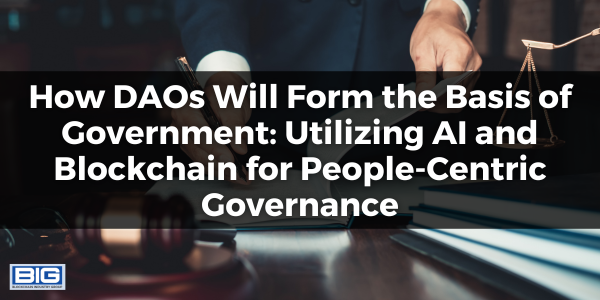
Decentralized Autonomous Organizations (DAOs) are poised to revolutionize the concept of governance, placing power directly in the hands of the people. By leveraging the potential of blockchain and artificial intelligence (AI), DAOs are paving the way for a new era of transparent, participatory, and inclusive governance.
In this article, we explore how DAOs will form the foundation of government structures and utilize AI and blockchain to foster efficient and people-centric governance.
DAOs: Empowering the People
Decentralized Autonomous Organizations are community-driven entities governed by smart contracts on the blockchain. DAOs allow individuals to participate in decision-making, fund allocation, and policy creation directly, bypassing traditional hierarchical structures. By enabling transparent voting and fostering collective decision-making, DAOs empower individuals to have a direct say in the governance processes that impact their lives.
Example: Community-Driven Budget Allocation
Imagine a city where the budget allocation process is determined by a DAO. Citizens can propose projects and initiatives they believe will benefit the community. Through blockchain-based voting mechanisms, residents can collectively decide how public funds should be allocated. The use of smart contracts ensures transparency and accountability, eliminating the need for intermediaries and fostering a truly inclusive and people-centric governance model.
Utilizing AI for Efficient Decision-Making
Artificial intelligence plays a crucial role in enhancing decision-making processes within DAO-based governments. AI algorithms can analyze vast amounts of data, identify patterns, and provide insights to support informed decision-making. By integrating AI into DAOs, governments can leverage the power of data-driven intelligence to tackle complex challenges and optimize resource allocation for the betterment of society.
Example: AI-Enhanced Policy Recommendations
In a DAO-based government, AI algorithms can analyze a wide range of data, including citizen feedback, socioeconomic indicators, and environmental factors, to generate policy recommendations. These recommendations can be presented to DAO members for evaluation and voting. By combining the collective wisdom of the community with AI-powered insights, governments can make informed and efficient policy decisions that address the needs and aspirations of their constituents.
Blockchain for Transparent and Secure Governance
Blockchain technology serves as the foundation of DAO-based governance, providing transparency, security, and immutability. The decentralized nature of blockchain ensures that governance decisions and transactions are recorded on a public ledger, making them accessible to all stakeholders. The use of blockchain also enhances security by minimizing the risk of fraud, corruption, and manipulation.
Example: Transparent Voting and Decision-Making
Blockchain-based voting systems enable transparent and tamper-proof voting processes within DAOs. Each vote is recorded on the blockchain, ensuring transparency and accountability. Citizens can verify their votes and participate in the decision-making process with confidence, knowing that their input is valued and protected.
Battle of Titans: IBMs Deep Blue vs. Garry Kasparov
—
Building Smart Cities with Smart Contracts: Blockchain, AI, and the Future of Urban Development
—
Competitive Edge with Revolutionary AI
Challenges and Considerations
While the potential of DAOs, AI, and blockchain for governance is promising, there are challenges to address. Ensuring inclusivity, addressing algorithmic biases, and managing privacy concerns are critical considerations. Collaborative efforts between technologists, policymakers, and communities are necessary to create frameworks that strike a balance between innovation and safeguarding individual rights and collective well-being.
DAOs, powered by blockchain and AI, hold the potential to transform governance by placing power directly in the hands of the people. By fostering transparency, participatory decision-making, and efficient resource allocation, DAOs pave the way for a more inclusive and people-centric government. As societies continue to evolve, embracing the potential of DAOs and emerging technologies will be essential in creating governance models that truly represent and serve the diverse needs of the people.



